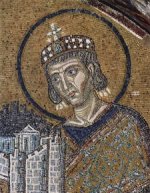
Worksheets and No Prep Teaching Resources
Reading Comprehension Worksheets
Ancient Rome

Ancient Rome
 Worksheets and No Prep Teaching Resources Reading Comprehension Worksheets Ancient Rome |
 Ancient Rome |
| edHelper's suggested reading level: | grades 7 to 9 | |
| Flesch-Kincaid grade level: | 8.79 |
|
Constantine the Great and Christianity
By Vickie Chao |

|
 1 Since the beginning of time, the ancient Romans worshipped hundreds of gods and goddesses. Many of those deities came from foreign lands that the Romans had conquered. As different faiths sprang up across the ever-expanding empire, they were more or less tolerated. Such open attitude, however, was not the case for Judaism and Christianity. Both religions pointedly refused to honor Roman gods and to idolize Roman emperors. As a result, the Jews and Christians endured centuries of hardship. One good example would be Emperor Nero. In 64 A.D., a big fire engulfed Rome and destroyed much of the city. Emperor Nero pinned the blame on the Christians. Through relentless persecution, he also allegedly killed two Christian apostles -- Saint John and Saint Peter.
1 Since the beginning of time, the ancient Romans worshipped hundreds of gods and goddesses. Many of those deities came from foreign lands that the Romans had conquered. As different faiths sprang up across the ever-expanding empire, they were more or less tolerated. Such open attitude, however, was not the case for Judaism and Christianity. Both religions pointedly refused to honor Roman gods and to idolize Roman emperors. As a result, the Jews and Christians endured centuries of hardship. One good example would be Emperor Nero. In 64 A.D., a big fire engulfed Rome and destroyed much of the city. Emperor Nero pinned the blame on the Christians. Through relentless persecution, he also allegedly killed two Christian apostles -- Saint John and Saint Peter. |
Create Weekly Reading Books
Prepare for an entire week at once! |
| Leave your feedback on Constantine the Great and Christianity (use this link if you found an error in the story) |
 |
Ancient Rome
|
 |
High School Reading Comprehensions and High School Reading Lessons
|
 |
Social Studies
|